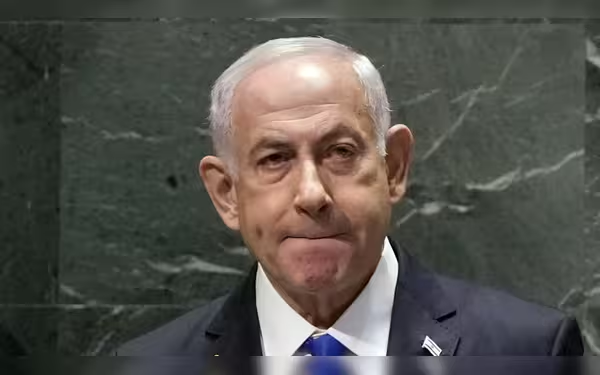Saturday, November 16, 2024 08:22 PM
Netanyahu Approves Attacks on Hezbollah in Lebanon
- Netanyahu confirms approval of pager attacks on Hezbollah.
- 39 killed, over 3,400 injured in Beirut explosions.
- Israel escalates military actions following the attacks.
 Image Credits: france24
Image Credits: france24Israeli PM Netanyahu confirms approval of deadly pager attacks on Hezbollah, escalating tensions in Lebanon.
In a significant escalation of tensions in the Middle East, Israeli Prime Minister Benjamin Netanyahu has confirmed that he approved a series of pager attacks targeting the Iran-backed Lebanese armed group, Hezbollah. This revelation comes amidst ongoing cross-border conflicts that have intensified since the onset of the Gaza war in October 2023. The attacks, which occurred in September, have raised serious concerns regarding security and the methods employed in modern warfare.
On September 17, a coordinated attack saw thousands of pagers explode simultaneously in the southern suburbs of Beirut and other strongholds of Hezbollah. These devices detonated after emitting beeping sounds, which indicated an incoming message. The aftermath was devastating, with reports indicating that the incident resulted in the deaths of 39 individuals and left over 3,400 others injured. Many of the victims suffered severe injuries, including eye damage and missing fingers, highlighting the brutal impact of the explosions.
A spokesperson for Netanyahu's office, Omer Dostri, confirmed the Prime Minister's approval of the attacks, stating that they dealt a significant blow to Hezbollah. Initially, the Israeli military refrained from commenting on the detonations, but the scale of the incident prompted a response. A Hezbollah official, who chose to remain anonymous, described the attacks as the "biggest security breach" the group has faced in nearly a year of conflict with Israel.
Reports from Israeli media suggest that during a cabinet meeting, Netanyahu acknowledged the operation, revealing that some senior defense officials and political figures were against the use of pagers for the attack. However, he decided to proceed, indicating a strong resolve to undermine Hezbollah's capabilities. The group has been utilizing pagers as a low-tech communication method to avoid detection by Israeli forces, making the attacks particularly impactful.
Following the pager detonations, Israel escalated its military actions by targeting Hezbollah leader Hassan Nasrallah in an airstrike and launching incursions into southern Lebanon. This series of events underscores the ongoing volatility in the region and the lengths to which both sides are willing to go in this protracted conflict.
As the situation continues to unfold, it is crucial for observers to understand the implications of such military strategies. The use of technology in warfare, especially in unconventional ways, raises ethical questions and highlights the evolving nature of conflict in the 21st century. The tragic loss of life and the injuries sustained by innocent civilians serve as a stark reminder of the human cost of war. Moving forward, it is essential for all parties involved to seek diplomatic solutions to prevent further escalation and to protect civilian lives.













